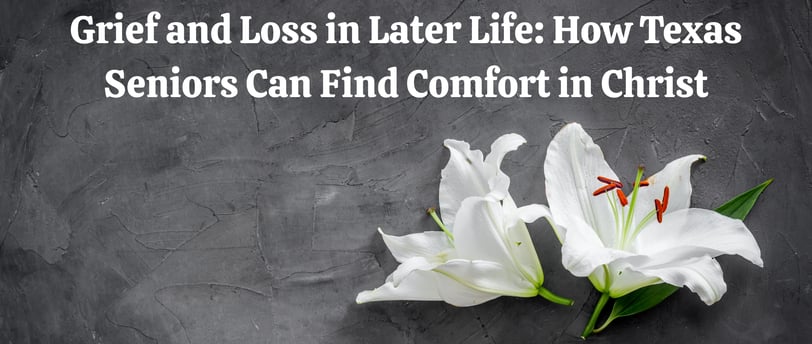Grief and Loss in Later Life: How Texas Seniors Can Find Comfort in Christ


Grief and Loss in Later Life: How Texas Seniors Can Find Comfort in Christ
"Blessed are those who mourn, for they shall be comforted." — Matthew 5:4 (NASB)
Later life brings a unique accumulation of loss that younger generations often cannot fully comprehend. By our 70s and 80s, most Texas seniors have buried parents, siblings, lifelong friends, and sometimes even children or grandchildren. We've said goodbye to beloved pets, familiar neighborhoods, physical abilities we once took for granted, and dreams we'll never see fulfilled. Each loss layers upon the others, creating a weight of grief that can feel overwhelming.
Queen Elizabeth II, who experienced profound personal losses while maintaining public dignity, once observed that "grief is the price we pay for love." For seniors who have loved deeply and long, this price can feel almost unbearable. Yet Christ's words in the Beatitudes offer a promise that speaks directly to hearts heavy with accumulated sorrow: those who mourn will indeed be comforted.
Understanding Grief's Unique Character in Later Life
Cumulative Sorrow: Unlike younger people who typically grieve one major loss at a time, seniors often carry multiple unresolved griefs simultaneously. The death of a spouse may reactivate grief from losing parents decades earlier, creating a complex emotional landscape that requires special understanding.
Anticipatory Grief: Many seniors find themselves grieving losses that haven't yet occurred—their own mortality, the potential loss of remaining loved ones, or the approaching end of independence. This forward-looking grief can be particularly isolating because others may not recognize it as legitimate sorrow.
Disenfranchised Grief: Society often fails to acknowledge certain losses that deeply affect seniors—the death of a pet who provided daily companionship, the loss of driving privileges, or grief over adult children's life choices. These "lesser" losses can feel profound but receive little recognition or support.
Physical Impact: Grief affects older bodies differently, potentially triggering health complications, medication interactions, or exacerbating existing conditions. The phrase "dying of a broken heart" reflects a real medical phenomenon more common among seniors.
Christ's Promise of Comfort
Jesus' declaration that mourners will be comforted isn't empty consolation—it's a divine promise backed by God's character and demonstrated throughout Scripture. This comfort comes in multiple forms, each uniquely suited to the nature of senior grief.
Present Comfort Through His Spirit: The Holy Spirit serves as our Comforter, providing supernatural peace that transcends human understanding. This isn't the absence of sorrow, but the presence of divine strength to carry the sorrow without being crushed by it.
Community Comfort Through His Body: God often provides comfort through other believers who understand loss. Texas churches are filled with seniors who can offer the comfort they themselves have received from God during their own seasons of grief.
Eternal Comfort Through His Promises: The hope of reunion in heaven provides unique comfort to seniors facing mortality. Unlike younger grievers who might find talk of heaven abstract, older adults often find great peace in the approaching reality of seeing loved ones again.
Practical Steps for Processing Senior Grief
Give Yourself Permission to Grieve: After a lifetime of being strong for others, many seniors feel they should handle loss stoically. However, grieving isn't weakness—it's the natural response of love encountering separation. Jesus himself wept at Lazarus's tomb, modeling that grief honors our relationships.
Acknowledge the Complexity: Your grief may include relief (especially after caring for someone with dementia), guilt (over things said or unsaid), anger (at God, circumstances, or even the deceased), and confusion (about identity and purpose). These complex emotions are normal and don't reflect poorly on your faith.
Create Memorial Practices: Develop meaningful ways to honor those you've lost. This might include visiting graves, looking through photo albums on special dates, continuing traditions they loved, or donating to causes that mattered to them.
Share Your Stories: Don't let others' discomfort with grief silence your need to talk about those you've lost. Share memories, speak their names, and celebrate the impact they had on your life. Their stories are part of your story.
Seek Professional Support When Needed: Complicated grief, depression, or persistent physical symptoms may require professional intervention. Seeking help isn't a failure of faith—it's wise stewardship of your mental and physical health.
Finding God in the Valley of Shadows
Remember His Faithfulness: Look back over your life and recall how God sustained you through previous losses. The same God who carried you through earlier griefs remains faithful and present in current sorrows.
Lean into Lament: The Psalms provide a biblical model for honest expression of grief to God. David frequently poured out his anguish while ultimately affirming God's goodness. Your tears and questions don't threaten God—they draw you closer to His heart.
Accept Comfort in Small Doses: Divine comfort often comes in small, daily portions rather than dramatic interventions. Notice God's kindness in a friend's phone call, a beautiful sunset, a grandchild's hug, or unexpected peace during difficult moments.
Hold onto Hope: While grief may be the price of love, the Christian story doesn't end with loss. The resurrection of Christ guarantees that death doesn't have the final word, and every goodbye on earth points toward an eternal hello in heaven.
Supporting Other Grieving Seniors
Presence Over Platitudes: Avoid minimizing others' grief with phrases like "they're in a better place" or "everything happens for a reason." Instead, offer practical help, listening ears, and physical presence during difficult times.
Remember Ongoing Needs: Grief doesn't follow a timeline, and seniors may need support months or years after a loss. Continue checking in, inviting them to activities, and acknowledging important dates long after the funeral flowers have wilted.
Include Rather than Isolate: Invite widowed friends to family gatherings, include them in church activities, and help them maintain social connections that prevent isolation and depression.
The Comfort That Comes
Queen Elizabeth's insight about grief being love's price reminds us that deep sorrow often indicates deep love—and deep love never truly dies. While we cannot avoid the pain of loss, we can rest in Christ's promise that our mourning will not be without divine comfort.
This comfort doesn't erase the grief or pretend the loss didn't matter. Instead, it provides supernatural strength to carry the sorrow, hope that transcends present pain, and the assurance that love itself is eternal. Every tear you shed is seen by the One who bottles them (Psalm 56:8), and every moment of mourning moves you closer to the day when He will wipe away every tear from your eyes.
Grief may be love's price, but comfort is Christ's promise. In your mourning, you are not forgotten, not alone, and not without hope.
